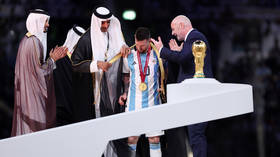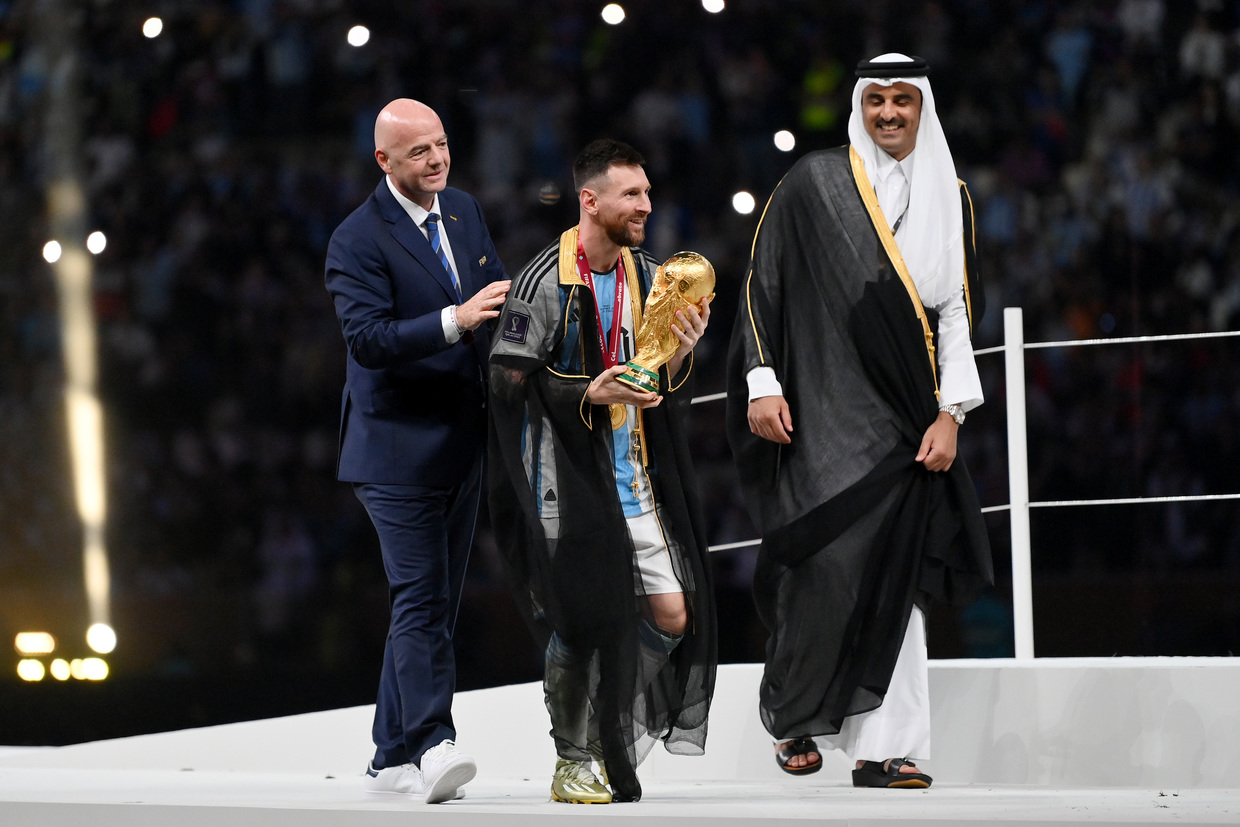
The Argentine captain was dressed in a traditional bisht before lifting the trophy

Messi was draped in the robe at the presentation ceremony at the Lusail Stadium. © Clive Brunskill / Getty Images
Debate has erupted among football fans and pundits after Lionel Messi was given a traditional Arab robe to wear before he lifted the World Cup trophy in Qatar.
The Argentine captain helped his country secure a third title in their history by coming out on top of a dramatic final against France on penalties after the score had finished 3-3 following extra time at the Lusail Stadium.
But while the final itself was widely regarded as the greatest of all time, the topic of Messi being draped in a traditional Arab robe known as a bisht by the emir of Qatar, Sheikh Tamim bin Hamad al-Thani, on the podium has proven somewhat more divisive.
“It is a dress for an official occasion and worn for celebrations,” explained the secretary general of Qatar’s tournament organising committee Hassan Al Thawadi, to BBC Sport.
“This was a celebration of Messi.”
In the BBC studio, however, Messi’s former Argentina teammate and Manchester City legend Pablo Zabaleta asked “Just why?” while on punditry duties.
“There’s no reason to do that,” he added.
The host of the British broadcaster’s Qatar 2022 coverage, Gary Lineker, was also critical of the “shame” in covering Messi’s Argentina shirt during a “magic moment.”

Messi was given the robe before making his way to lift the famous trophy. © Dan Mullan / Getty Images
On Twitter, there were similar comments such as: “Cannot believe Messi finally wins the World Cup and is made to put on a robe to lift the trophy. You just don’t do that,” from one journalist.
“I’m by no means losing any sleep over this, but it’s just obvious that players lift the trophy with their shirt on show. Just seemed a bit odd,” he added.
“It spoils the aesthetic. You win a football tournament, the biggest ever, you have your shirt on show, surely? I don’t know what the cultural significance of that robe is, but that’s the way it always is.”
Cannot believe Messi finally wins the World Cup and is made to put on a robe to lift the trophy. You just don’t do that
— Si Lloyd (@SmnLlyd5) December 18, 2022
Considering FIFA made such a huge fuss about players wearing a 🌈 armband, it's incredulous Lionel Messi was dressed in this robe by Infantino & the Qatar monarch to photobomb the greatest moment of his career. This day belongs only to La Albiceleste #ARG#FIFAWorldCup2022pic.twitter.com/QcBBfMbmNJ
— Rob Blanchette (@_Rob_B) December 18, 2022
“Considering FIFA made such a huge fuss about players wearing a [rainbow] armband, it’s incredulous Lionel Messi was dressed in this robe by Infantino and the Qatar monarch to photobomb the greatest moment of his career. This day belongs only to La Albiceleste,” claimed another party.
Those on the other side of the argument couldn’t see the fuss, however.
Pelé wearing a Sombrero Mexican hat after winning his 3rd FIFA World Cup in 1970. What are you all mad about? pic.twitter.com/KXfheE9rfh
— Ouissal Harize| وصال حريز (@OuissalHarize) December 18, 2022
“Culturally, dressing someone [in] a ‘bisht’ is an act of courtesy and high appreciation in Qatar. Thus, Messi was highly respected by the Emir of Qatar dressing him [in] the Bisht.
“Ignorant Western media shall learn about cultures instead of whining as usual!” tweeted a well-followed Turkish user.
Culturally, dressing someone a“Bisht” (the robe) is an act of courtesy & high appreciation in #Qatar.Thus, #Messi𓃵 was highly respected by the Emir of Qatar dressing him the Bisht.Ignorant Western media shall learn about cultures instead of whining as usual!#FIFAWorldCupFinalpic.twitter.com/5Se3sQVSaa
— Dr. Abdallah Marouf د. عبدالله معروف (@AbdallahMarouf) December 18, 2022
Lineker and the BBC had best explain what the issue was with Messi wearing a traditional Arab desht (robe)? "Seems a shame", why?🤔The flood of anti-Arab/Islamophobic commentary on BBC this WC has been appalling!#BBC#ArgentinaVsFrance#WorldCupFinal#Qatar2022pic.twitter.com/NDU0dvaWMw
— Robert Carter 🇲🇦 🏆 (@Bob_cart124) December 18, 2022
“It’s perfectly possible to think it was odd to put an Arab robe on Messi at the end, but can we stop with the racist, Orientalist, anti-Arab BS please?” a Washington-based NBC reporter of Arab descent demanded.
“Also, a sombrero was put on Pele’s head at the 1970 Mexico World Cup final, seconds after Brazil won it. So give it a rest.”
“Lineker and the BBC had best explain what the issue was with Messi wearing a traditional Arab desht (robe)? ‘Seems a shame’, why?” scathed a British journalist and researcher.
“The flood of anti-Arab/Islamophobic commentary on BBC this World Cup has been appalling!”
“If Messi had worn a controversial One Love rainbow propaganda armband, Lineker and the rest would [probably] have praised him,” he continued.
“Since he wore an Arabian bisht, coverage was negative. Shameful and ugly display by BBC this World Cup.”
Messi comments on retirement chances
Also making headlines for his conduct on the podium was Argentina goalkeeper Emi Martinez.
The Aston Villa man was arguably as big a hero as Messi on Sunday with a last-gasp extra time save that denied France scoring a winner and then saving a penalty in the shootout and psyching out Aurelien Tchouameni, which saw the Real Madrid midfielder hit his effort past the post.
After receiving the Golden Glove award for the tournament’s best shotstopper, Martinez went viral for a rude gesture made when holding the award pointing out of his crotch – which divided opinion like Messi’s bisht-wearing.
The World Cup trophy ceremony, one of the most prestigious and most-watched moments in sportEmi Martinez: pic.twitter.com/Wwvxe15Rtb
— Football Ramble (@FootballRamble) December 18, 2022
Later in the dressing room as Argentina celebrated their win, Martinez held a ‘minute’s’ silence for defeated French star Mbappe, who became only the second ever player to a score a hat-trick in a World Cup final.
This was perceived as revenge for a dig the wonderboy had in a TNT Sports Brazil interview earlier this year, when claiming that South American teams lag behind their European counterparts.




